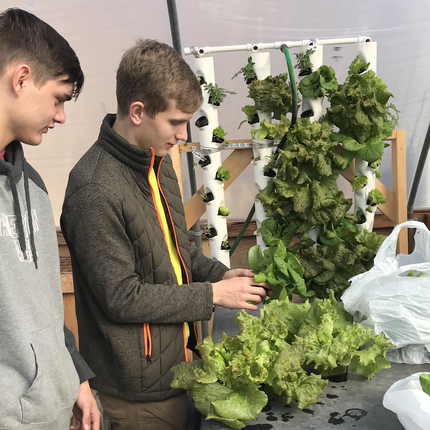Justin Carter contributed to this blog.
During this school year, students at Nebraska Christian Schools in Central City have been eating fresh, delicious vegetables in their school lunches—vegetables they grew themselves in their school greenhouse.
Not only have they gotten to enjoy and taste the fruits of their labor, these students have also been rewarded for their hard work.
Schools around the state of Nebraska applied for and competed to be recognized for their agricultural efforts and the first Greenhouse to Cafeteria award.
The Center for Rural Affairs, in collaboration with Nebraska FFA, piloted the program to acknowledge schools for exemplary greenhouse education. Applicants were judged on categories including diversity and quantity of produce grown, water and input management, student involvement, community involvement, and more.
Nebraska Christian Schools went above and beyond in all categories, and was chosen as this year's Greenhouse to Cafeteria award winner.
From sophomores to seniors, 21 students spent time in their school’s greenhouse in exchange for school-based service hours during the spring transplanting season.They learned about general plant knowledge; prairie ecosystem/prairie restoration and management; plant propagation, growth, and maintenance; landscape basics; plant-based marketing and entrepreneurship with an emphasis on the growth, marketing, and sale of ornamental plants; and plant display and design.
They grew tomatoes, cilantro, radishes, cucumbers, lettuce, green beans, a lemon tree, and pineapple plants. The students also used their hydroponics system to grow bok choy plants, and marigolds to keep aphids at bay. They grew garlic plants as insect deterrents. Their harvested produce was then used by the school’s cafeteria.
Botany students designed and built the hydroponics system in their industrial technology class, and students with an interest in succulents designed, planted, and marketed miniature succulent gardens.
Dee Flynn, science instructor at Nebraska Christian Schools, guided students throughout the process of greenhouse setup and operation.
“The students were very proud of their hydroponics system and learned so much about insect control, controlling algae growth, starting seeds effectively, and cutting at the proper time to ensure regrowth in order to keep the system producing,” Dee said. “They take a lot of pride in their home-built system, having worked out the timing on the watering, and other various factors that enabled us to grow lush, tasty lettuce with a minimum of waste.”
Justin Carter, project associate with the Center for Rural Affairs, helped create and design the award and select the winners.
“Nebraska Christian Schools has done a fantastic job of letting their students run with greenhouse projects,” he said. “The creativity on projects is exceptional, and they also have great collaboration with assistance from local organizations and produce going into the community. We hope their success can inspire other schools to be adventurous with their greenhouse programs and think outside the box.”
Outside of classroom activity, students were involved in plant sales at numerous school functions; watering; and monitoring/management of hydroponics over the weekends. They also cleaned and sanitized reusable containers.
Nebraska Christian Schools partners with local businesses and organizations to use their greenhouse as a community learning project in addition to the curriculum-based learning during school hours.
Students worked in conjunction with the education and production manager from Prairie Plains Institute out of Aurora, Nebraska. In the fall, students visited the prairie to collect seeds and participate in on-site instruction. The production manager then visited the classroom to teach them about planting and seed propagation. Students started more than 30 varieties of prairie plants, resulting in 1,500 seedlings that were transplanted to the prairie.
Additionally, the school partnered with a local winery/steakhouse and its in-house chef. Students learned about and grew fresh herbs that the chef used at the steakhouse. Then, she took dishes in which she used the herbs to the school.
The students have also taken on project-based partnerships including growing asparagus seedlings for a local producer, seedless watermelons for a local gardener who provides produce for their cafeteria, and vegetable transplants for a community garden that shares 50% of its production with the local food bank.
Dee said the students are very encouraged by receiving the Greenhouse to Cafeteria award, and excited to know their efforts have been acknowledged.
“Thank you for recognizing the breadth of our program and the various ways our students use their skills from industrial arts, marketing, and art, plus developing teaching and personal relationship skills as they participate in the botany program,” Dee said. “We are thrilled to get the Greenhouse to Cafeteria award. I thank the Center for Rural Affairs for sponsoring such a contest to encourage school greenhouse operations.”
The message and idea behind the award is new this year, and with outstanding candidates like Nebraska Christian Schools, there is every reason to believe it will grow even stronger in the years to come.
“It's our hope that the Greenhouse to Cafeteria award will become a staple of the many agriculture awards handed out to schools each year,” said Justin. “We want to inspire food production throughout Nebraska and cultivate a new generation of farmers.”
For their outstanding efforts, Nebraska Christian Schools received recognition from the Center for Rural Affairs and Nebraska FFA, as well as a gift certificate to a greenhouse/gardening supply store of their choice.
The award will be offered again in 2022. For more information, visit cfra.org/greenhouse-cafeteria or contact Justin Carter at [email protected].






